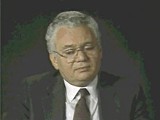You searched for: Deportation jews from germany to poland
<< Previous | Displaying results 21-30 of 263 for "Deportation jews from germany to poland" | Next >>
-
Escape routes from German-occupied Europe, 1942
MapThroughout most of German-occupied Europe, the Germans sought to round up and deport Jews to killing centers in occupied Poland. Some Jews survived by hiding or escaping from German-controlled Europe. Some escape routes out of occupied Europe led to belligerent states (such as the Soviet Union), neutral states (such as Switzerland, Spain, Sweden, and Turkey), and even to states allied with Germany (such as Italy and Hungary before they were occupied by Germany). After the German attack on the Soviet Union,…

-
Rescue of Danish Jews, fall 1943
MapGermany occupied Denmark in 1940. When the Germans decided to deport Jews from Denmark in August 1943, Danes spontaneously organized a rescue operation and helped Jews reach the coast; fishermen then ferried them to neutral Sweden. The rescue operation expanded to include participation by the Danish resistance, the police, and the government. In little more than three weeks, the Danes ferried more than 7,000 Jews and close to 700 of their non-Jewish relatives to Sweden, which accepted the Danish refugees.…

-
Thomas Buergenthal describes an emigration operation in an orphanage in postwar Germany
Oral HistoryThomas's family moved to Zilina in 1938. As the Slovak Hlinka Guard increased its harassment of Jews, the family decided to leave. Thomas and his family ultimately entered Poland, but the German invasion in September 1939 prevented them from leaving for Great Britain. The family ended up in Kielce, where a ghetto was established in April 1941. When the Kielce ghetto was liquidated in August 1942, Thomas and his family avoided the deportations to Treblinka that occurred in the same month. They were sent…
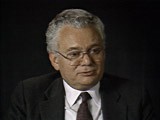
-
Blanka Rothschild describes antisemitic regulations in occupied Lodz, Poland
Oral HistoryBlanka was an only child in a close-knit family in Lodz, Poland. Her father died in 1937. After the German invasion of Poland, Blanka and her mother remained in Lodz with Blanka's grandmother, who was unable to travel. Along with other relatives, they were forced into the Lodz ghetto in 1940. There, Blanka worked in a bakery. She and her mother later worked in a hospital in the Lodz ghetto, where they remained until late 1944 when they were deported to the Ravensbrueck camp in Germany. From Ravensbrueck,…
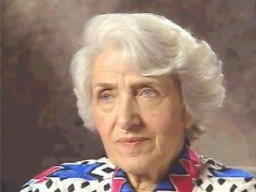
-
Frank Bleichman describes conditions in and dangers facing a partisan camp in the forests of Poland
Oral HistoryFrank was one of seven children born to a religious Jewish family in Kamionka, in the Lublin district of Poland. Germany invaded Poland in September 1939. When deportations of Jews from the Lublin area began in 1942, Frank joined a group of Jewish partisans who roamed the forests in search of weapons and food. After obtaining weapons by posing as Soviet paratroopers, they were able to defend themselves against German raids and take revenge against collaborators. They gradually made connections with Polish…

-
Aron (Dereczynski) Derman describes events that took place upon the German invasion of Slonim, Poland
Oral HistoryAron was born to a middle-class Jewish family in Slonim, a part of Poland between the two world wars. His parents owned a clothing store. After studying in a technical school, Aron worked as a motion-picture projectionist in a small town near Slonim. The Soviet army took over Slonim in September 1939. War broke out between Germany and the Soviet Union in June 1941. Aron returned to Slonim. The Germans soon occupied Slonim, and later forced the Jews into a ghetto. Aron was forced to work in an armaments…
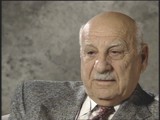
-
Hans Heimann describes Italian aid to Jews
Oral HistoryThe Germans annexed Austria in March 1938. In 1939, Hans fled first to Hungary and then to Italy. He and his parents were interned in various towns. Hans's father became ill and died in 1940. In 1943, Hans and his mother were warned of German plans to deport Jews from Italy to Poland. They moved to smaller towns until liberation by the British in August 1943. Hans worked as an interpreter for the Allies until 1945, when he worked for the American Jewish Joint Distribution Committee and helped resettle…
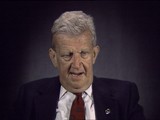
-
Chelmno
ArticleThe Chelmno killing center was the first stationary facility where poison gas was used for mass murder of Jews. Killing operations began there in December 1941.
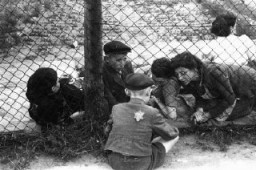
-
Frank Bleichman describes a German raid, with assistance from individual Poles, on a group of Jewish partisans
Oral HistoryFrank was one of seven children born to a religious Jewish family in Kamionka, in the Lublin district of Poland. Germany invaded Poland in September 1939. When deportations of Jews from the Lublin area began in 1942, Frank joined a group of Jewish partisans who roamed the forests in search of weapons and food. After obtaining weapons by posing as Soviet paratroopers, they were able to defend themselves against German raids and take revenge against collaborators. They gradually made connections with Polish…

-
Thomas Buergenthal describes being reprieved from a massacre of children while he was in a forced-labor camp in Kielce
Oral HistoryThomas's family moved to Zilina in 1938. As the Slovak Hlinka Guard increased its harassment of Jews, the family decided to leave. Thomas and his family ultimately entered Poland, but the German invasion in September 1939 prevented them from leaving for Great Britain. The family ended up in Kielce, where a ghetto was established in April 1941. When the Kielce ghetto was liquidated in August 1942, Thomas and his family avoided the deportations to Treblinka that occurred in the same month. They were sent…
